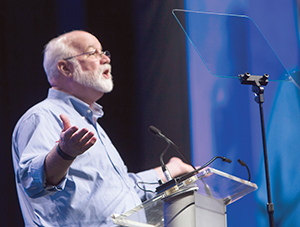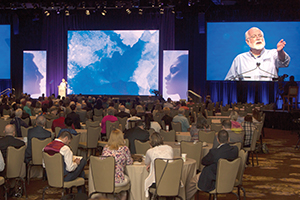
Photo credit: Jerry Naunheim Jr. / © CHA
Fr. Gregory Boyle
By JULIE MINDA
ORLANDO, Fla. — The founder of the world's largest gang intervention program told attendees at the Catholic Health Assembly last month that the "only praise I think God has any interest in, is 'that you may be one.' That we inch our way to the margins to enter into relationship with others and allow ourselves to be reached by them."
Fr. Gregory Boyle, SJ, founder and executive director of the decades-old Homeboy Industries, sprinkled his address on the closing day of the gathering with witty anecdotes about street attitude and the poignant life stories of gang members he has known, employed and befriended. He offered insights into the human condition and a spirituality seated in an appreciation of what can be learned in honest, raw encounters with others, particularly those on society's margins.

Photo credit: Jerry Naunheim Jr. / © CHA
Fr. Gregory Boyle, SJ, founder and executive director of Homeboy Industries, addresses the Catholic Health Assembly.
Fr. Boyle has spent nearly 30 years working with some of Los Angeles' most hardened gang members, to help them get the services, job training, jobs and care they need to exit a life of crime. "Fifteen thousand folks a year walk through our doors trying to reimagine their lives," he said.
Based in Los Angeles' poorest community, the nonprofit Homeboy Industries has evolved to include a bakery, café, catering service, merchandise center, farmers' markets, diner, grocery store and silk screen and embroidery business — all of them employing gang members seeking a better life. The nonprofit also provides case management, employment services, mental health services and legal services. Through a partnership, Homeboy Industries provides high school education. It also provides general equivalency diploma preparation and life skills classes.
And, he added, "No place on the planet removes more tattoos."
Fr. Boyle said that people serving poor and vulnerable populations should not view and position themselves solely as service providers, but rather they should enter into authentic relationships with those they are serving. "How do we obliterate this illusion that we are separate — us and them …? We need to bridge that distance" between service provider and service recipient. "We are all in need of healing."
By entering into kinship with others, people can create communities that God would recognize as his own, Fr. Boyle said.
He spoke of gang members he'd encountered whose lives were destroyed by trauma, violence, abuse and neglect — experiences that drove them into the security of gang life. One gang member had been beaten repeatedly and severely by his mother throughout his elementary school years. He wore three T-shirts to school every day to absorb and hide the blood from his weeping wounds.

Photo credit: Jerry Naunheim Jr. / © CHA
Catholic Health Assembly attendees converse at the annual meeting, which drew ministry members to Orlando, Fla., June 5-7.
That man transformed himself with Homeboy Industries' support. He now mentors others exiting gangs. Fr. Boyle said that long after the childhood beatings had stopped, that man had continued for many years wearing three shirts out of deeply ingrained shame. "I didn't want anyone to see the wounds," the man had explained once. But he gained a new perspective during his transformation and quit wearing extra layers of clothing. Fr. Boyle said the man once said, "Now my wounds are my friends." He had learned that it was through his own healing — and his willingness to expose his vulnerability — that he could heal others.
Fr. Boyle said messages of shame and disgrace like the ones that man had heard throughout his childhood are at the heart of many of the ills driving people into crime. "We have to reach in and dismantle these messages," he said. "We have to tell people the truth that we are all the same and that 'you are exactly what God had in mind as he made you.'"
Copyright © 2016 by the Catholic Health Association
of the United States
For reprint permission, contact Betty Crosby or call (314) 253-3477.